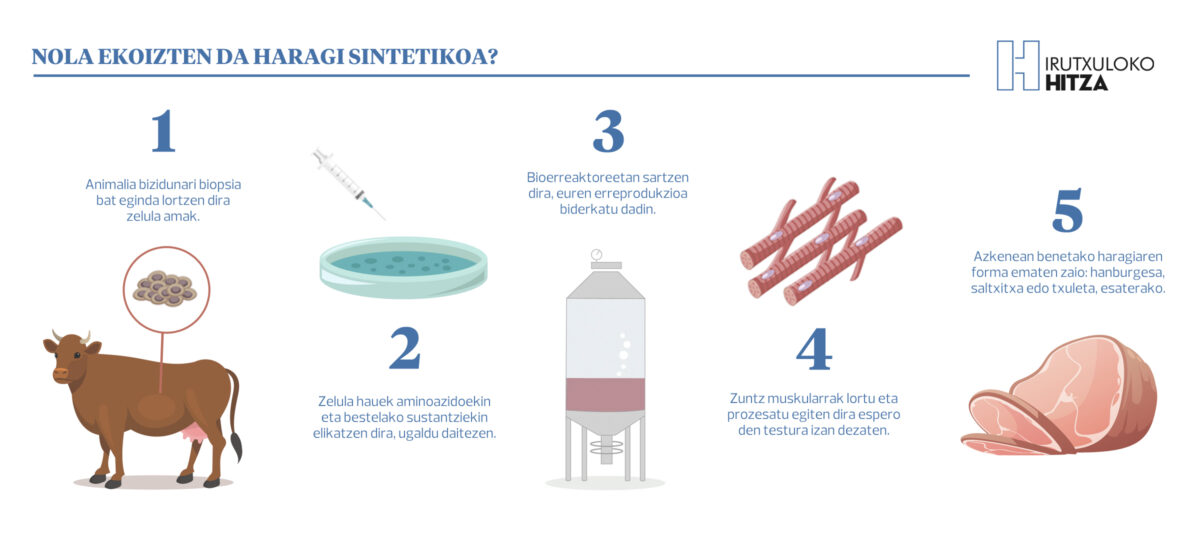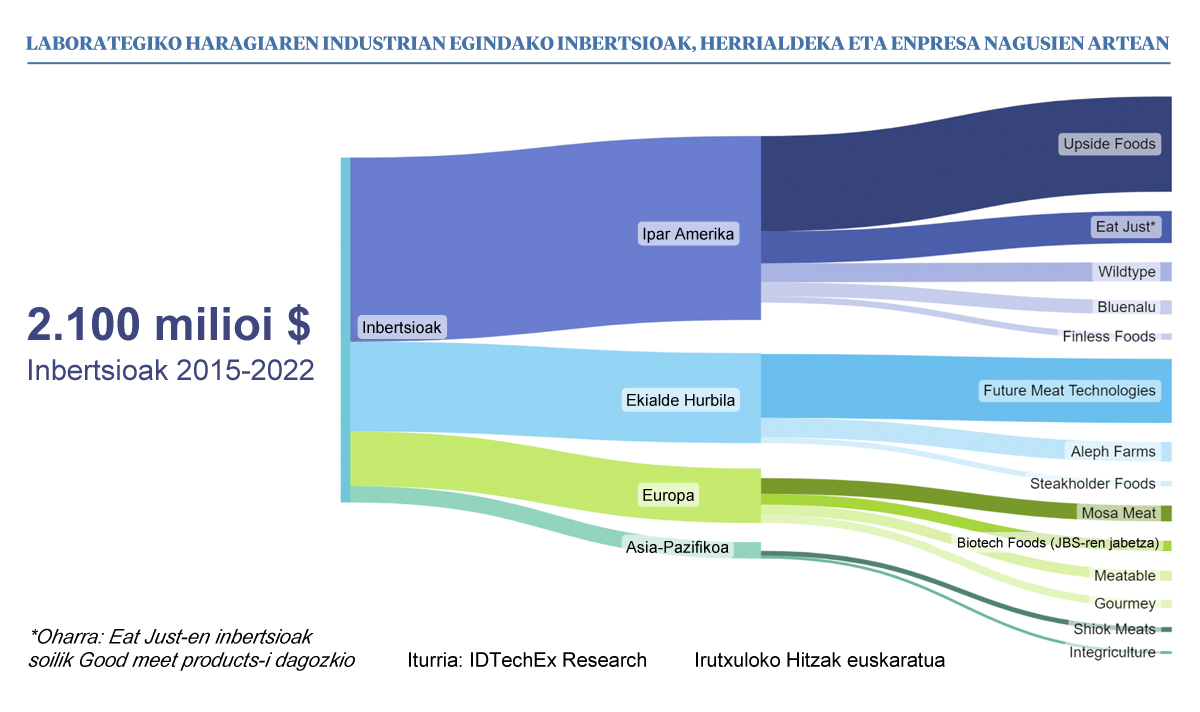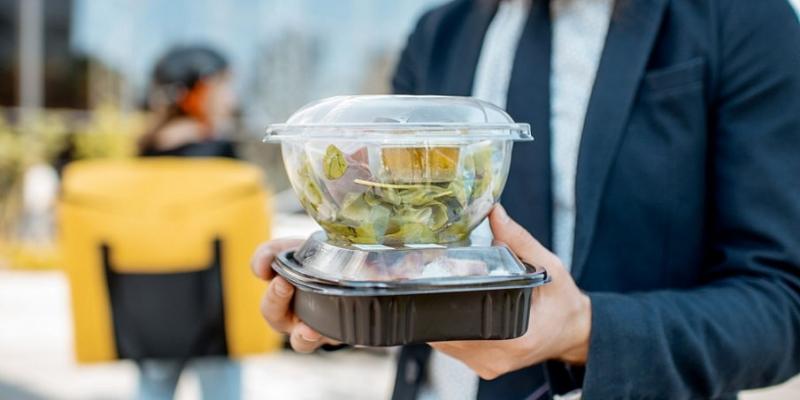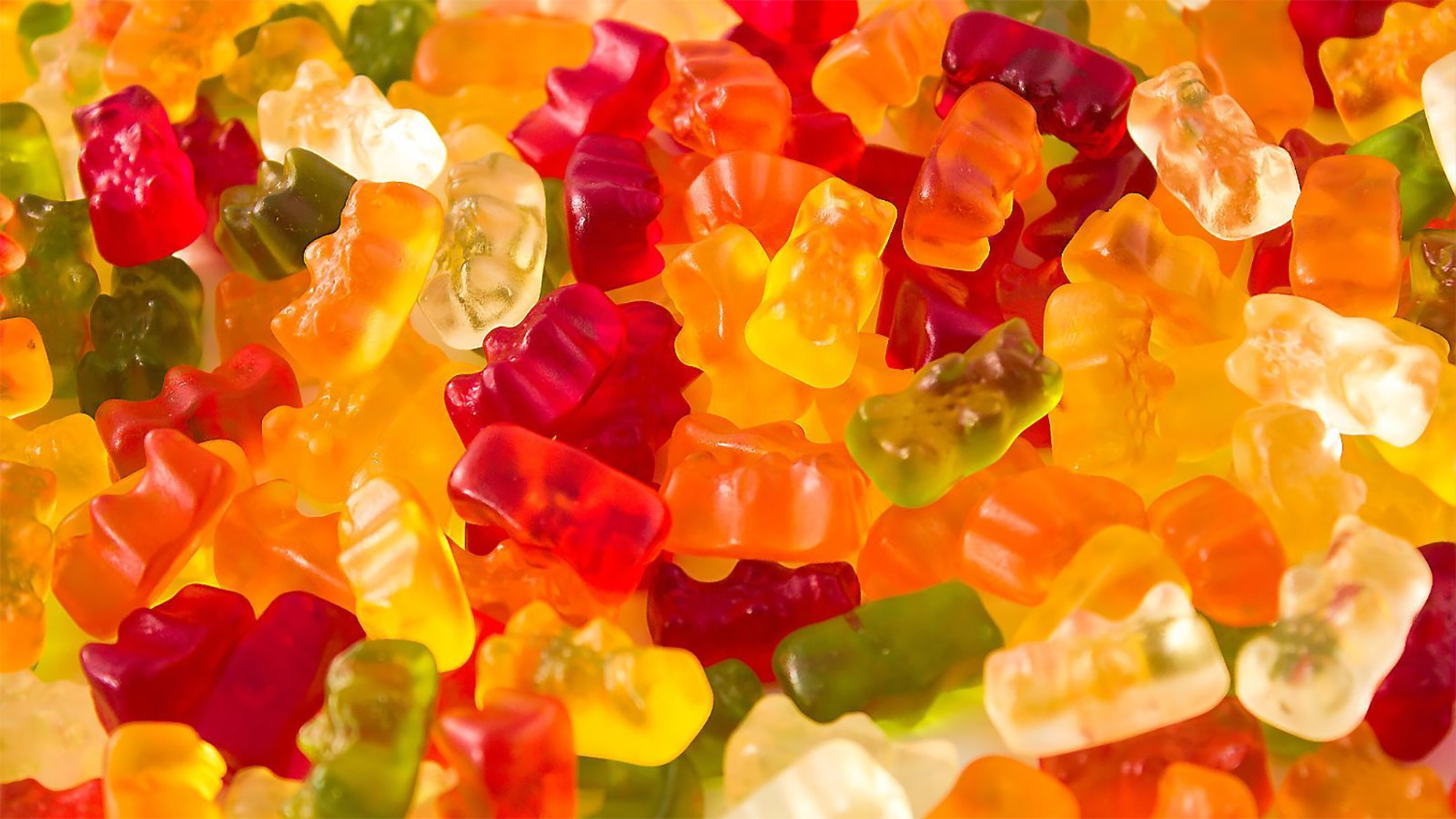In 2013, the first edible “hamburger” created in a laboratory was presented to the media around the world. The project, developed by the Dutch researcher Mark Post of the University of Utrecht, has only increased research and production in laboratory meat. Companies are being created around the world in a race on who will dominate the market of the future.
In fact, according to journals and economic websites, by 2030, 16% of the protein that is eaten around the world will be consumed through this derivative of the laboratory, with the money it entails.
San Sebastian leads this career both in Europe and in the world. In fact, one of the largest factories in the world will be built in the industrial estate Eskusaitzeta de Zubieta: 11,000 m2 and 150 workers with an annual production capacity of 4,000 tonnes of synthetic meat.
Hundreds of media around the world are presenting laboratory meat as one of the main alternatives to real meat, which in addition to taking care of the environment, appears to solve problems related to animal welfare and food safety.
The future, an alternative to traditional meat, has attracted millions of investment worldwide, especially by the most well-known digital technology companies: One of them is Bill Gates, who sees lab meat as an alternative to climate change.
Beyond optimistic speeches in the media, if we look at academic publications, the scientific community seems more sceptical, as they insist that “we don’t know enough” about the subject. To see the direction the debate is taking: By 2020, there were 12,900 news items online, but only 327 scientific articles.
But what is lab meat?
It was presented publicly in 2013, but has not yet started to market normally. At the end of 2021, it was approved for the first time in Singapore and last week in the US the marketing of chicken synthetic meat.
The name is also discussed: laboratory meats, artificial meats, synthetic meats, in vitro meats or culture meats are used. There are even those who question the use of the word flesh.
In any case, this artificial meat is not related to products that are so far ‘meat substitutes’ for the vegan market: soya burgers, tofu sausages or six fillets. In this case, the process is made from animal stem cells: companies confirm that the tissue formed by cell multiplication has the texture and properties of real meat.
How is synthetic meat produced?
One of the virtues of synthetic meat is that animals should not be killed in the process: a small sample of the muscle tissue of a living animal is removed by a biopsy “without damaging the animal”. Stem cells, due to their ability to differentiate and proliferate, are placed in a growth medium with amino acids, carbohydrates, vitamins and minerals to enhance their growth.
The next step is produced in a bioreactor, in a kind of large pot, with nutrients and controlled conditions of temperature, humidity, etc. The goal is to keep growing and multiplying cells and forming a three-dimensional cellular mass. Once the three-dimensional cellular mass is obtained, electrical stimulation and mechanical stretching are applied to turn it into muscle fiber. The fibers multiply and the drivers of the industry ensure that they develop the same texture as real meat.
Once properly developed, they will be extracted from bioreactors, refined and molded into a final product by different techniques, including 3D printing.
Is it better for the environment?
In the struggle to get a marketable product before anyone else, companies and start-ups have great secrecy. This means of communication has not been able to make telephone interviews with the company BioTech Foods and when sending this number to the printing press the questions sent by email remained unanswered.
For example, the environmental impact of the industrial development of this method of meat farming is unknown. According to a study carried out by the University of Oxford in 2019, for the environmental benefits of laboratory meat to be real in the long term, an “energy revolution” would have to be produced, as cell-grown bioreactors will consume a lot of electricity.
In fact, the alleged environmental benefits of synthetic meat production have not yet been analysed in depth. According to various studies, if the current techniques for the production of synthetic meat were extended to supply the market, they would produce between four and 25 times more carbon dioxide (CO2) than that for the breeding and slaughter of animals. CO2 is the main greenhouse gas responsible for climate change.
Although this technology would reduce the use of land, water and antibiotics, although not entirely safe, it would generate more CO2, as after the purification processes that give nutrients to the cultured cells, tons of fossil fuels are burned.
According to the results of the study published on the bioRXiv portal by several researchers from the University of California: ‘In the short term, the environmental impact of synthetic meat production is likely to be greater than that of average beef production if a very refined means of production is used’.
To avoid legal problems?
In December 2020, the Republic of Singapore approved the marketing authorisation for synthetic chicken and paved the way for other countries. However, they had to wait until June 23 of this year, last week, the first authorisation to market synthetic chicken in the US.
In terms of investment and manufacturing, the USA and Israel are the most advanced countries: the first factory that was built in the second country and the first in which the largest are projected.
And in Europe, then, what? At the moment it is totally prohibited. On the contrary, companies are confident that as production progresses, marketing possibilities will be clarified. However, there are some difficulties. Because European laws are not as flexible with GM and hormone use as other countries. Although not based on GMOs, BioTech Foods told the Basque Government that it would use a genetically modified bacteria called Escirichia coli. In March 2021 the Government granted it the authorisation, ensuring that it is type 1 and therefore legal.
European states are starting to legislate for themselves: In Italy, the right-wing government of Giorgia Meloni has banned the consumption of food and insects from the laboratory in the name of ‘the health, quality and protection of our culture and traditions’. In 2021, the French National Assembly made an amendment to the Climate and Resilience Act, banning synthetic meats in school canteens. The ban is curious when it cannot yet be consumed throughout the country.
Millions of grants
Iñigo Charola and Mercedes Vila founded the start-up BioTech Foods in 2017, which in a short time has received numerous subsidies and investments. The EHNE trade union announced that the Eskusaitzeta meat laboratory project received €5.2 million from the Spanish Government in 2021 and another €753,000 from the public body ICEX Spain Export and Investments. On the other hand, the Gehitu programme of the Basque Government provides for a subsidy of EUR 18 million for BioTech Foods.
The El Salto journal details these grants: In 2022, BioTech Foods and 1,442,505 in 2023 received 250,000 euros from the Gehitu program. Under the Aldatu programme, it received €1,000,000 in 2022; it received 170,000 for the Sumeat project in 2021, 65,636 in 2019 and 35,130 in 2020. From the Hazitek program, 137,600 in 2022 and 87,400 in 2023.
BioTech Foods is one of eight agri-food and technological companies that have received EUR 3.7 million from the Centre for Technological and Industrial Development of the Spanish Ministry of Science to promote the production of synthetic meat under the Culturedmeat programme. It has also received funds from the European Commission, in particular EUR 2.7 million under the Meat 4 All programme. The City of San Sebastian last year awarded the prize and recognition to innovative companies.
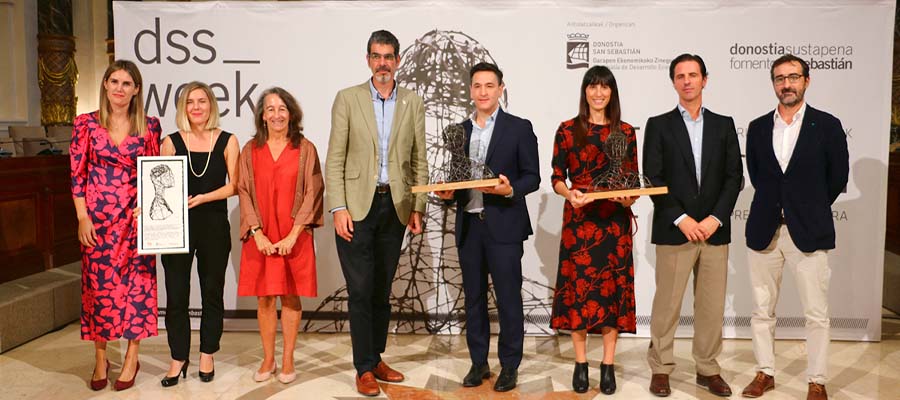
Angry farmers
Last week EHNE met in Eskusaitzeta and criticised the project. According to the union president, Garikoitz Nazabal, the false meat laboratory is a project based on ‘silence and lie’: they call it ‘frankenstein meat’.
Nazabal denounces the "lies" behind the project: “They say it’s more sustainable than livestock. That is not at all true, that is false. Some university studies say that laboratories will contaminate 25 times more CO2 than livestock."
Beyond sustainability, Nazabal fears in which direction it is developing in the future: “Instead of bringing people to food sovereignty, we are leaving our food to the multinationals and our dependence on them. Instead of producing as much food as possible there and having as diversified food as possible, we leave these companies to market stem cells, delegating to them patents and this knowledge." And he warns: ‘We are leaving our food to economic and multinational interests’.





